Dixie [1]
By Daniel Decatur Emmett
Annotations by Celia Hawley
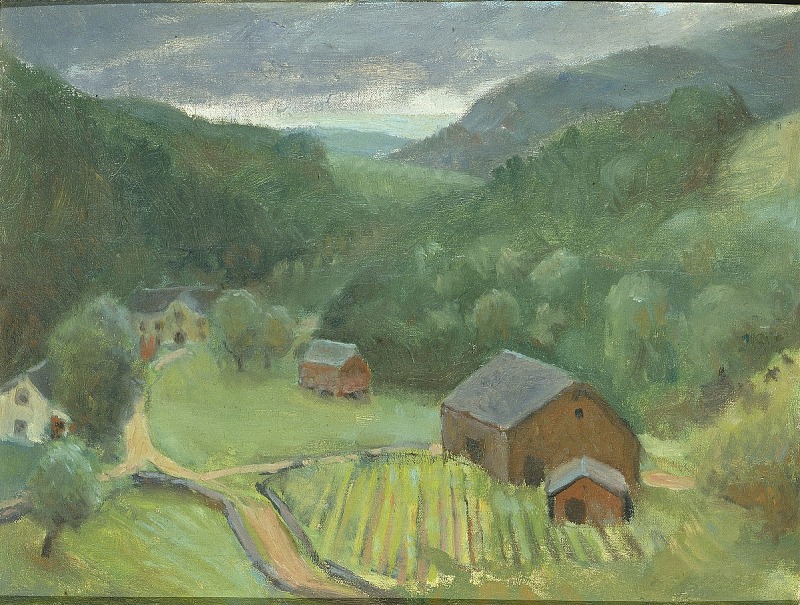
I wish I was in de land ob cotton;
Old times dar am not forgotten,
Look away! Look away! Look away! Dixie Land.
In Dixie Land whar’ I was born in,[2]
Early on one frosty mornin’,
Look away! Look away! Look away! Dixie Land.
CHORUS:
Den I wish I was in Dixie, Hoo-ray! Hoo-ray!
In Dixie land, I’ll take my stand to live and die in Dixie;
Away, away, away down south in Dixie,
Away, away, away down south in Dixie.
Old Missus marry Will-de-weaber [3]
Willium was a gay deceaber;
Look away! Look away! Look away! Dixie Land.
But when he put his arms around ‘er
Smiled as fierce as a forty-pounder,
Look away! Look away! Look away! Dixie Land.
CHORUS
His face was sharp as a butcher’s cleaver,
But dat did not seem to greab ‘er;
Look away! Look away! Look away! Dixie Land.
Old Missues acted the foolish part,
And died for a man dat broke her heart,
Look away! Look away! Look away! Dixie Land.
CHORUS
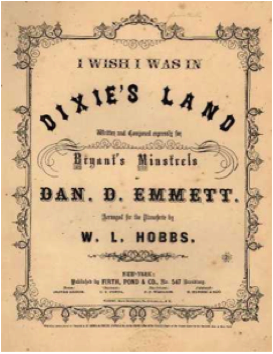
Now here’s health to the next old Missus,
And all the gals dat want to kiss us:
Look away! Look away! Look away! Dixie Land.
But if you want to drive ‘way sorrow,
Come and hear dis song tomorrow,
Look away! Look away! Look away! Dixie Land.
CHORUS
Dar’s buckwheat cakes an Injun batter,
Makes you fat or a little fatter;
Look away! Look away! Look away! Dixie Land.
Den hoe it down and scratch your grabble,
To Dixie’s land I’m bound to trabble,
Look away! Look away! Look away! Dixie Land.
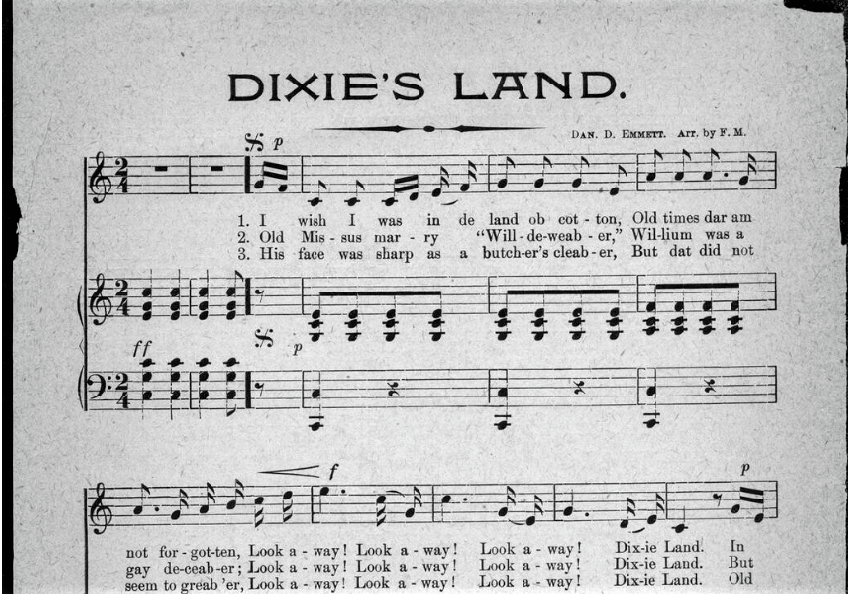
Away down South in de fields of cotton, [4]
Cinnamon seed and sandy bottom;
Look away, look away,
Look away, look away.
Den ‘way down South in de fields of cotton,
Vinegar shoes and paper stockings;
Look away, look away,
Look away, look away.
Den I wish I was in Dixie’s Land,
Oh- oh! Oh – oh!
In Dixie’s land I’ll take my stand,
And live and die in Dixie’s Land,
Away, away, away,
Away down South in Dixie.
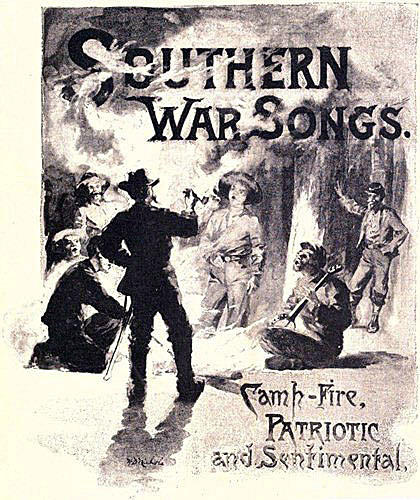
Pork and cabbage in de pot,
It goes in cold and comes out hot;
Look away, look away,
Look away, look away.
Vinegar put right on red beet,
It makes them always fit to eat;
Look away, look away,
Look away, look away.
Den I wish I was in Dixie’s Land,
Oh -oh! Oh – oh!
In Dixie’s land I’ll take my stand,
And live and die in Dixie’s Land,
Away, away, away,
Away down South in Dixie.
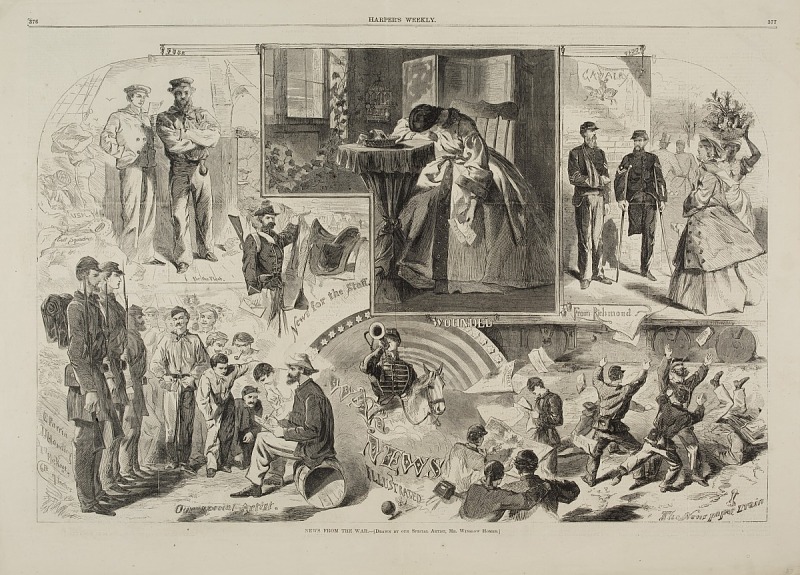
Dixie’s Land by Daniel Decatur Emmett, 1859
Dixie as sung by Confederate SOldiers
[1] Composed in 1859 in New York City and titled “Dixie’s Land”, this instantly recognizable song is now more commonly known as “Dixie”. The first set of lyrics shown is the original composition.
[2] The lyrics, by a white male northerner, are written in an unflattering and exaggerated idiom imagining how a black southern slave might speak.
[3] Watch for multiple instances of the letter ‘b‘ used in place of the what should be understood as the letter ‘v.‘
[4] Lyrics as sung by the Confederate soldier, according to the book Southern War Songs.
Contexts
Although known as a Southern anthem, “Dixie’s Land,” aka “Dixie” was written in the north for the minstrel stage. The song was so popular in the South that it became generally accepted as the rallying song of the Confederacy.
Blackface: the Sad History of Minstrel Shows The ghosts of our past that are still with us.
Abraham Lincoln first heard the song at a Minstrels show in Chicago in 1860. According to a fellow attorney who attended the show with him, after “Dixie’s Land” was played, Lincoln clapped and shouted “Let’s have it again! Let’s have it again!” About the Song – Ballad of America
Where does the name Dixie come from? “Dixie” became associated so quickly with the South that many Americans attributed its very name to the region. In fact, the precise origin of the word “Dixie” remains unknown, though three competing theories persist. It either references a benevolent New York slaveholder named Dix, (“Dix’s Land”); the issue in Louisiana of $10 notes ( ‘dix’ is the number 10 in French); or — and most likely — the land below the Mason and Dixon line (the slaveholding South). During the Civil War, soldiers, civilians and slaves frequently referred to the South as Dixie and considered Emmett’s ditty the region’s anthem. (This information gathered from the articles on this page.)
- From How the Term Dixie Came to Define the South, from CNN:
The word Dixie takes on a different meaning for different people. Most commonly, it’s associated with the old South and Confederate states. Dixie was considered the land south of the Mason-Dixon line, where slavery was legal. But once the term was used in a minstrel song, its correlation with racist ideologies became crystal clear, according to Ingram. “Most historians would agree that Dixie is a word people understand as obviously a reference not just to a place, but a certain kind of ideology,” said Ingram, a history professor at College of Charleston in South Carolina. “There’s no mystery around all this,” she said. “People’s instincts about this being a problematic term is definitely correct. It’s correlated with something a lot darker than just history.” She added: “By the time Dixie made it into minstrel shows, it was clearly understood to be more than just a place name. ‘Dixie’ was the antebellum South, and the lyrics evoke a very nostalgic and romanticized view of slavery.”
Pedagogy
The song “Dixie” is an example of why knowing the history, the backstory, of a piece of iconic culture is critical to genuine understanding. From one of the most famous minstrel songs performed as theater to the recognized tune we know today, “Dixie’s” roots were planted in the ground of race, class struggle, and misogyny. Written by a white man, ostensibly from the perspective of a loyal slave, its trajectory into the present traces the history of black oppression in America. It has been embraced by the Dixiecrat party of the 1940’s, sung by white women protesting integration of schools in Arkansas and elsewhere, and is part of the score of the film Birth of a Nation, a movie that helped revive the Ku Klux Klan.
Many cruel stereotypes about the character of black people originated in the 19th century. Discuss why the practice of stereotyping can be so misleading and harmful. Give examples.
The Minstrel Song that Forever Changed the American South
How “Dixie” Became and Endured as an Anthem Interview from National Public Radio, 2019, includes sound clips
Contemporary Connections
What Dixie Really Means, from the Atlantic Magazine; a popular culture example from 2020
The Anthemic Allure of ‘Dixie,’ An Enduring Confederate Monument from NPR
R.D. Wilson is a contemporary visual artist whose work is professionally acclaimed and has popular appeal.